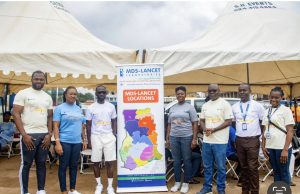In a bid to address Ghana’s pressing school infrastructure needs, Mr. Paul Adjei, Administrator of the Ghana Education Trust Fund (GETFund), has urged stakeholders to explore innovative and diversified funding sources.
Speaking at the National Education Forum in Ho, Volta Region, Mr. Adjei emphasized that the country’s over-reliance on GETFund as the primary source of funding for educational infrastructure is unsustainable. He called for a shift towards private sector-led initiatives and other alternative financing models to bridge the gap.
Under the theme “Transforming Education for a Sustainable Future,” the forum brought together key stakeholders to discuss strategies for improving Ghana’s educational landscape. During a breakout session titled “Government and Stakeholder Partnerships in School Infrastructure Development in Ghana,” Mr. Adjei delivered a paper highlighting the urgent need for collaboration between the government, private sector, and communities to address infrastructure challenges at all levels of education.
Mr. Adjei proposed several alternative funding mechanisms, including private sector investments, community-driven projects, contributions from the diaspora, endowment funds, philanthropic foundations, and development partnerships. He stressed that these approaches would not only alleviate the financial burden on GETFund but also ensure the timely construction, maintenance, and management of school facilities.
The GETFund Administrator also advocated for the use of cost-effective and time-efficient solutions, such as high-quality prefabricated materials, in school construction projects. He noted that these materials could significantly reduce costs and accelerate project completion, enabling more schools to be built within shorter timeframes.
The session also emphasized the importance of fostering community ownership and involvement in the management and maintenance of school facilities. Participants agreed that engaging local communities would ensure the sustainability of infrastructure projects and promote a sense of responsibility among stakeholders.
Additionally, the forum highlighted the need for a phased approach to large-scale infrastructure projects, particularly at the tertiary level. This strategy would allow for the partial use of facilities before their full completion, ensuring that students and educators can benefit from the infrastructure even as construction continues.
The National Education Forum was officially launched by His Excellency President John D. Mahama, who encouraged all Ghanaians to actively contribute to the development of a comprehensive blueprint for education transformation. The infrastructure breakout session was chaired by Prof. Samuel Attintono, Principal of Accra College of Education, with Prof. Mohammed Salifu and Mr. Kwame Azu serving as moderators.
Mr. Adjei’s call for private sector-led school infrastructure development marks a significant step towards addressing Ghana’s educational challenges. By embracing innovative funding models and fostering partnerships, the country can create a more sustainable and inclusive education system that meets the needs of future generations.
Send your news stories to newsghana101@gmail.com
Follow News Ghana on Google News














